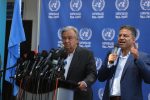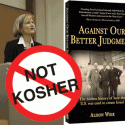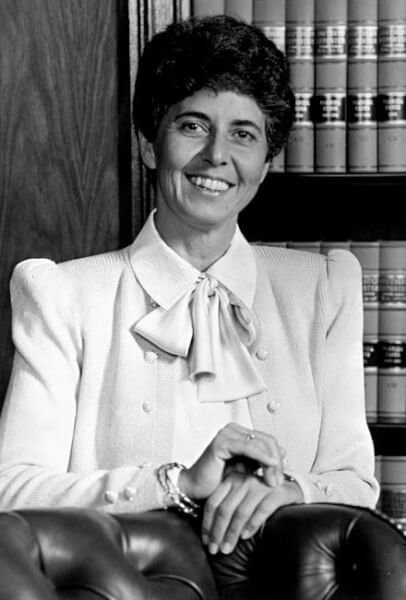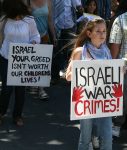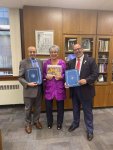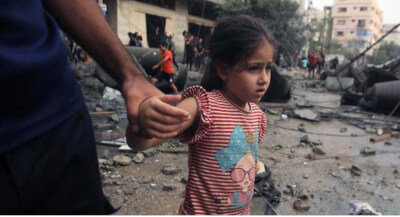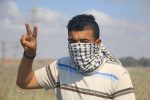UN Secretary General visits Palestine, Israel
United Nations Secretary General Antonio Guterres visited Israel and Israeli occupied-Palestine, meeting with officials on both sides this week including Palestinian Prime Minister Rami Hamdallah in Ramallah, a visit to the Yasser Arafat Museum and also a tour of the economic oppression of civilians in the Israeli-embargoed Gaza Strip.
By Mohammed Asad
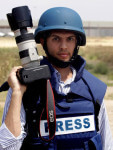
United Nations Secretary General Antonio Guterres continued his tour of the Middle East after stopping in Israel and in Ramallah, visiting the Gaza Strip where he witnessed the continuing suffering of nearly 2 million Palestinian civilians under the crushing oppression of Israel’s 12-year-long embargo.
Guterres, who met with Palestinian officials in Ramallah, including with Palestinian Prime Minister Rami Hamdallah on Tuesday, August 29, was greeted by hundreds of Palestinians while touring the Gaza Strip where he held a meeting with the news media.
Guterres spoke to the media at the United Nations school in Beit Lahia, in the Northern Gaza Strip.
Palestinians held placards greeting Guterres in Beit Lahia in the northern Gaza Strip on August 30, 2017.
Here are the official remarks of Secretary General Guterres while in Palestine.

Opening remarks at press conference with Prime Minister Rami Hamdallah of the State of Palestine
António Guterres August 29, 2017
Thank you very much, Mr. Prime Minister, for your words and for your warm reception here in Ramallah.
I want to express very strongly the total commitment of the United Nations, and my personal total commitment, to do everything for a two-state solution to the materialize. I’ve said several times that there is no plan B to the two-state solution.
A two-state solution that will end the occupation and, with the creation of conditions, also the suffering even to the Palestinian people, is in my opinion the only way to guarantee that peace is established and, at the same time, that two states can live together in security and in mutual recognition, and we do everything we can to work in that direction.

That means, naturally, that it is important to remove the obstacles for that solution to be implemented. We recognize that the settlement activity that, as I’ve said several times, is illegal under international law, that the settlement activity is an obstacle that needs to be removed in relation to the possibility of two-state solution to be adequately implemented.
Of course, there are more difficulties, more obstacles. It’s important to create the conditions for leaders on both sides to appeal for calm, to avoid forms of incitement, for violence to settle down… There are many things that need to be done, but obviously, the settlement activities represent a major obstacle in relation to the implementation of the two-state solution.
It is my deep belief that it is essential to restart a serious and credible political process of negotiation aiming at that objective – the two-state solution – as it is also important to create conditions on the ground to improve the situation of Palestinian populations. But it is also important to recognize that improvements of economic and social nature and mobility on the ground are not a replacement for the two-state solution or for the serious political process of the negotiation. They are just a necessary complement of these negotiations to strengthen its viability and to make sure that there is a peace dividend felt by populations that help enhance also the commitment of populations in relation to peace.

I would also like to say that we remain very concerned with the humanitarian situation in Gaza. We are totally committed to support UNRWA’a activity as well as the activities of reconstruction that are taking place in Gaza. We will do also everything possible to support the effort that President Abbas is making in order to create conditions for a unified leadership both in West Bank and Gaza, with the dialogue for peace behind it. I want to express also my wishes of the best success in all your efforts to improving the governance, improving the action that you have been undertaking with us, Prime Minister, to the benefit of the people of Palestine.
Remarks to the press at Yasser Arafat Museum
António Guterres August 29, 2017
When visiting this museum, there are of course many emotions and many feelings, but the most important of them is the feeling of the suffering of the Palestinian people. Since many years, when in different capacities as Prime Minister of Portugal and as president of an international political organization, I was following very closely the peace process, in its hopes and in its frustrations.
I have a dream, a dream to see in the Holy Land two states: A Palestinian state and an Israeli state, living together in peace and security, in mutual recognition and allowing for this kind of suffering not to be possible anymore.
Whatever I can do as Secretary-General of the United Nations to support what I believe is necessary — a serious political process aiming at creating the two-state solution and at the same time a serious process to improve the living conditions of the Palestinian people — everything that I will be able to do, I feel deeply motivated to do my best.

UN Secretary General Antonio Guterres reinforced his support of the Two-State Solution before embarking on the Palestine-Israel trip.
Here are his remarks on the Role of Religious Leaders in Peacebuilding in the Middle East delivered on July 18, 2017
António Guterres July 18, 2017
I want to thank the High Representative for the United Nations Alliance of Civilizations, Mr. Nassir Abdulaziz Al-Nasser, for organizing this important panel discussion.
I also commend the Government of Spain – and particularly Foreign Minister Alfonso María Dastis – as well as the many religious leaders gathered here for your initiative.
The Holy Land has a special place in the hearts of billions of people around the world. The faiths that you represent are branches of the same Abrahamic tree – and have done so much to contribute and enrich our world and global civilization.

I am tremendously inspired and uplifted by your efforts to come together around shared values and a shared commitment to building peace.
As you know better than anyone else, we live in a world where long-standing conflicts continue and new ones are emerging. Some parts of the Middle East have been the site of so much bloodshed and torment.
With every passing day, frustration grows, hope diminishes, and the perspective of a peaceful resolution of the Israeli-Palestinian conflict seems more distant.
As I have continuously stressed, the two-state solution is the only path to ensure that Palestinians and Israelis realize their national and historic aspirations and live in peace, security and dignity. The expansion of illegal settlements, or the violence or the incitement undermine this prospect.
In my opinion, there is no plan B.
Conflicts in the Middle East continue to feed extremism and radicalisation around the world.
Indeed, we are witnessing a spiralling wave of discrimination and stereotyping of “the other” in many places.
Religion is being distorted to increase differences.
Together we must counter such narratives.
Sustainable peace requires not only political will from all sides, but also the collective efforts of the international community, civil society and fundamentally, religious leaders.
We need to expand the space for dialogue to encompass local and regional leaders and other actors who have a voice and influence within their respective communities.
This is why I am so greatly encouraged by the Religious Peace Initiative, which was launched in Alicante last November.
As Muslim, Jewish and Christian religious leaders, you have the opportunity to teach the shared humanistic values of tolerance, understanding, compassion and peace.
These are the core values embraced by all three monotheistic faiths represented here today, and they can be the catalysts for peace.
I applaud your efforts towards promoting the peaceful co-existence between Palestinians and Israelis.
Your initiative points the way to a more hopeful future – a future of tolerance and mutual understanding as a pathway to just and lasting peace.
I thank you very much.


- UN Secretary General visits Palestine, Israel - August 30, 2017
- Fadi Thabit photo exhibit documents Gaza Life - July 14, 2017
- Palestinian children celebrate Ramadan Eid in besieged Gaza Strip - June 27, 2017













